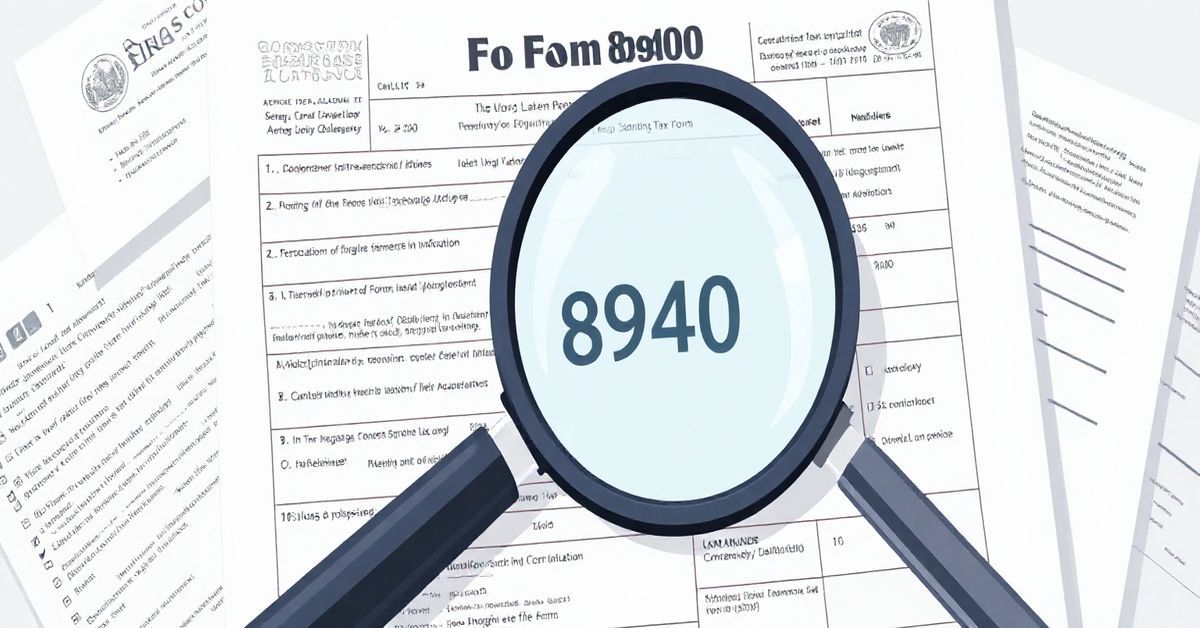Let’s face it, taxes can be complicated. Sometimes, you run into situations that don’t quite fit into the standard tax categories. When this happens, and you need clarification from the IRS, that’s where Form 8940, “Request for Miscellaneous Determination” comes in. It’s like asking the IRS for a ruling on a specific tax question that doesn’t have a predefined form.
What Exactly Does “Miscellaneous Determination” Mean?
Think of a “determination” as the IRS making a formal decision. When it’s “miscellaneous,” it means it’s about a topic that isn’t covered by another, more specific form. These situations can be diverse, ranging from tax-exempt status clarifications to very niche tax-related questions. This form helps to provide certainty and clarity when the usual forms don’t quite cut it.
When Would You Need to File Form 8940?
You wouldn’t use Form 8940 for everyday tax matters like filing your income tax return or claiming deductions. Instead, this form addresses more uncommon situations. Here are some examples to help clarify:
- Tax-Exempt Status Clarification: If you’re an organization applying for tax-exempt status and want clarification on a specific part of the process, or if you think a previous determination is incorrect, Form 8940 might be needed.
- Foundation Status Issues: If your organization is a foundation and you need clarification on your private foundation status or you’re seeking to change your foundation classification, Form 8940 can come into play.
- Unusual Tax Situations: When the IRS hasn’t provided a specific form for a particular tax matter you face, you could use form 8940 to obtain a ruling. For instance, if there’s a unique financial transaction that you think could impact your taxes, or you have a charitable donation with unusual characteristics.
Essentially, if you have a tax-related question that doesn’t neatly fall into any other established category, Form 8940 is your tool for seeking an official response from the IRS.
How Does Form 8940 Work?
Filing Form 8940 is not as simple as filling out a typical tax return. Here’s a basic overview of the process:
- Identify the Need: First, you need to be certain that the issue you’re addressing doesn’t have a specific IRS form. The most common use for Form 8940 is for exempt organizations, but you don’t have to be one to use it.
- Gather Documentation: You’ll need to provide detailed information about your situation. This could include financial statements, organizational documents, or any other relevant paperwork.
- Fill Out the Form: The form itself is pretty straightforward but requires a very specific question or request on your part. You will have to state very specifically what you are requesting from the IRS.
- Submission: You can submit your form by mail to the IRS address specified on the form’s instructions.
- Await the Determination: After submission, the IRS will review your request and send you a formal determination letter. The processing times can vary.
Who Is Usually Affected?
While the form can be used by a variety of people, it’s more often used by the following:
- Nonprofit Organizations: Especially those seeking or maintaining tax-exempt status.
- Private Foundations: Needing clarity on their classification or specific aspects of foundation status.
- Taxpayers with Unique Situations: Anyone with tax issues not covered by existing forms can potentially use Form 8940.
- Tax Professionals such as CPAs and enrolled agents who handle the tax matters of their clients
Important Things to Note:
- Specificity is Key: When filling out the form, be as clear and detailed as possible about the situation and the determination you need. The more information, the better.
- Supporting Documents: Always include all relevant documents to support your request. Lack of evidence can delay or prevent the IRS from issuing a determination.
- No Guarantee of Success: Filing Form 8940 doesn’t guarantee a determination in your favor. The IRS will review your situation based on tax laws.
- Seek Professional Advice: Because these situations are often complex, it’s a good idea to get help from a tax professional who has experience with Form 8940, especially if you are not a tax professional yourself. They can guide you through the process and ensure that your request is presented correctly.
Related Concepts & Terms:
Understanding some related concepts can be beneficial:
- IRS Determination Letter: This is the official document the IRS sends to you stating their decision after reviewing Form 8940.
- Exempt Organization: A non-profit organization that is exempt from paying federal income taxes, often related to use of Form 8940.
- Private Foundation: A specific type of tax-exempt organization, commonly related to use of Form 8940.
- Tax Ruling: A formal interpretation of the tax code by the IRS.
Common Mistakes and Misconceptions:
- Thinking it’s for Routine Tax Matters: This form is for unique situations, not your annual tax return.
- Submitting without proper supporting documents: The IRS needs thorough documentation to make a determination. Make sure all documentation is present.
- Assuming a favorable outcome: The IRS will make a decision based on the laws, and it may not always be what you want.
- Not seeking expert help: These are unique situations, it’s usually better to use a tax professional.
In summary, Form 8940 is a way for the IRS to handle situations that don’t have a specific form assigned to them. It’s important to know what it’s for and whether you have a valid reason to use it. If you’re facing a tax situation that requires an official IRS determination outside of the norm, consulting with a tax professional is always a good idea. They can assess your situation and determine if Form 8940 is the right way to go. Always keep good records of all communication with the IRS, and understand that it can take the IRS some time to review your request.

